How did homo sapiens manage to dominate the earth? What happened to other human species? When and how did money, states, and religion appear? Why did the whole empires fall? This book answers all these and many other questions in detail.
The text looks a bit simplistic.
Written in a sort of novelistic manner, this historical book by professor Yuval Noah Harari provides a totally different view on habitual understanding of the world as we get it today. It touches upon many serious aspects of mankind's development including revolutions and numerous collective myths. In the meantime, historically important facts are "spiced up" with captivating stories.
Sapiens: A Brief History of Humankind
Yuval Noah Harari
Paperback, Kindle, Audiobook, Hardcover, Audio CD
464 pages / 33766 KB / 15 hours and 17 minutes
Harper Perennial; Illustrated edition (May 15, 2018)
How did it happen that some societies have sent people to space and invented computers while others got stuck on farming? Full of visual materials including maps, tables, and diagrams, the book casts a light on this issue taking into account the geographical, botanical, zoological, microbiological, linguistic, and other data.
Statement summaries could have been shorter overall.
The book has brought its author world fame and the literature award all writers are dreaming about. The Pulitzer winner Guns, Germs, and Steel by Jared Diamond offers a persuasive, compelling, and skillfully described the theory of the human race from an environmental and developmental point of view. The author enables the reader to consider the mechanism of human civilization evolution from a completely new angle.
Guns, Germs, and Steel: The Fates of Human Societies
Jared Diamond
Hardcover, Paperback, Kindle, Audiobook, Audio CD
528 pages / 113791 KB / 16 hours and 20 minutes
W. W. Norton & Company; Revised ed. Edition (July 17, 2005)
The whole genesis and development of humanity are predetermined by our planet. Climatic, geomorphological, and geological changes all directly impacted both the surprise of farming and the organization of modern states. How did it happen you wonder? You'll find the answers in the book.
Some proof-points look not persuasive enough.
It's yet another version of human race origin, evolution, and development from Lewis Dartnell that became a New York Times bestseller. The data-dense text is laid down in a light manner and simple language. The abundance of encyclopedic facts is infused with funny and curious patterns that convert scientific work into a real page-turner.
Origins: How Earth's History Shaped Human History
Lewis Dartnell
Hardcover, Paperback, Kindle, Audiobook
352 pages / 13696 KB / 9 hours and 9 minutes
Basic Books; Illustrated edition (May 14, 2019)
The work covers health problems research made from broad socio-cultural and biocultural perspectives touching upon the history and culture of humanity on the whole. It shows how these factors can make preventive medicine more effective and improve health worldwide.
Several chapters are fairly long.
The third edition of Medical Anthropology: A Biocultural Approach is a comprehensive modern overview of this quick-developing field laid down in an accessible manner and easy-to-read language. Full of up-to-day examples and questions promoting critical thinking, it's a perfect introduction book on the subject great for beginners in the field and anyone engaged in health care.
Medical Anthropology: A Biocultural Approach
Andrea S. Wiley and John S. Allen
Hardcover, Paperback
512 pages
Oxford University Press; 3rd Edition (November 8, 2016)
While reading this book, you'll travel back to the distant past to trace your ancient ancestors and learn about the Terolean man who died about 5000 years ago and whose remnants were found in the North of Italy in our days.
It is focused on the DNA history of only Europeans.
A sensational work of science, The Seven Daughters of Eve by Bryan Sykes is an easy and fascinating way to peek into a revolutionary mitochondrial DNA theory. During his extensive research, a reputable genetic scientist professor Sykes managed to find a living genetic relative of the Ice Man and made bold but compelling assumptions related to the common ancestry of Europeans.
The Seven Daughters of Eve
Bryan Sykes
Hardcover, Paperback, Kindle, Audiobook, Audio CD
320 pages / 1060 KB / 9 hours and 5 minutes
W. W. Norton & Company (July 17, 2001)
This site is a free online resource that strives to offer helpful content and comparison features to its visitors. Please be advised that the operator of this site accepts advertising compensation from certain companies that appear on the site, and such compensation impacts the location and order in which the companies (and/or their products) are presented, and in some cases may also impact the scoring that is assigned to them. The scoring that appears on this site is determined by the site operator in its sole discretion, and should NOT be relied upon for accuracy purposes. In fact, Company/product listings on this page DO NOT imply endorsement by the site operator. Except as expressly set forth in our Terms of Use, all representations and warranties regarding the information presented on this page are disclaimed. The information which appears on this site is subject to change at any time. More info
Yuval Noah Harari Sapiens:
A Page-tunring Odyssey of Mankind
It’s hard to imagine that someone can squeeze the subject worth hundreds of books into a single book but professor Yuval Noah Harari succeeded in this. In his book Sapiens, he guides the reader through the history of mankind, masterfully and effortlessly covering and explaining the key points in the process of development that started thousands of years ago and is still going. Highly valued by multiple publishers, critics, and readers, the book became an absolute bestseller and continues to blow the minds of more and more readers around the globe. And not without the reason.
Starting from the title, the book declares a pretentious promise to cover human history from the Stone Age till now and it brilliantly delivers on that promise. The focus is Homo sapiens as the species that managed not only to dominate the world but enhance their dominance and hold it for millennials. From that perspective, Harari divided the history of Sapiens into four parts that correspond to the parts in the book and include the Cognitive Revolution, the Agricultural Revolution, the Unification of Humankind, and the Scientific Revolution. Within those chapters, the author touches upon important and strongly arguable questions. Why, being not much different from animals, do humans stand out among them? Has farming really made us healthier and happier? Where has our unique ability to cooperate and communicate brought us? How do our fundamental scientific achievements change and shape us? These and many other interesting questions are discussed in this book in a very extraordinary and smart manner.
To say a few words about Harari’s writing style, it noticeably differs from altiloquent scientific narrations of traditional anthropology books. It is neither dry nor boring. Instead, it strongly resembles a novelistic style, which is engaging, captivating, and easy-flowing. With a decent amount of research behind it, the book doesn’t feel botched or amateurish, though.

An Engaging Read for Critical Thinkers
The opinions of multiple reviewers of Sapiens have expressly split. While some consider the book a piece of art and a must-read, others criticize Harari for being too subjective. Taking into account the book format and the span of time it covers, it is really provocative and ambitious. Yet, striking the golden middle, it should be noted that the author did an amazing job and his major goal (which was successfully achieved) was rather to provide a micro-view on human history than a deep insight with detailed reflections. And he did it with excellent wit. On the other hand, his standpoint is clearly seen through the whole text and he approaches habitual things and time-tested statements from a completely different perspective. As such, the book is certainly for critical thinkers, it makes the reader contemplate and promotes more profound research.
In the end, reading Sapiens: a Brief History of Humankind by Yuval Noah Harari is comparable to unpacking a long-waited and unknown present where each layer makes you wonder even more and pushes you to “unwrap” to the very gist. The book is more than pure anthropology. It also draws in other sciences like biology, paleontology, economics, and, of course, history.

Additional Info
| Last updated price | $11.40 |
| Stock | In stock |
| ASIN | 0062316117 |
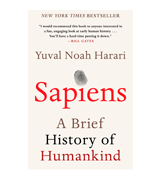
Jared Diamond Guns, Germs, and Steel:
A Flashback on Human Civilization
Have you ever thought why some continents undergo fast-paced economic growth and development while others still drown in poverty? Guns, Germs, and Steel by Jared Diamond casts the light on this issue and provides an interesting theory that looks highly persuasive and compelling.
A professor in geography and an experienced biologist, Diamonds studies the history of humanity through the environmental and biological lens. In fact, it was the question from his friend from New Guinea that pushed Diamond to create this book. “Why is it that you Europeans have so much more cargo than we do?” By cargo, he meant knowledge, technology, and goods manufactured. To explain why the world around is so uneven economically and why some people are obviously superior to the others in many senses, Diamond throws us back to the times when it all started and when humans switched from hunter-gatherers to farmers. This is where the core of the answer lies. Due to territorial, landscape, and climatic differences, Europeans had a whole lot of domesticable plants and animals. Initially, the European content had more natural resources that were of great value at that time and eventually pushed the growth in other spheres. Besides, the materials (such as metal) that set up prerequisites for technological growth are also not evenly distributed on our planet that gave some areas an advantage over the others. Likewise, the impact of germs and varying immunity defense was considered in the course of the survey and proved to largely affect the development of civilizations.
Throughout the whole book, the author delivers multiple facts along with biological, medicinal, and cultural data to support his theory and clarify some disputable issues. To do that in a more comprehensible manner, he provides a whole lot of visual material including tables, charts, diagrams, maps, and illustrations. So, the reader gets an opportunity to visualize the author’s major assumptions and generalize the layers of information given in the book.

An Award Winner
Books that raise globally important and highly disputable issues are always extensively reviewed and criticized, which is quite a normal thing, given the value they bring and the statements they make from the historical perspective. Guns, Germs, and Steel is not an exception in this concern. Masterfully written by an experienced scientist, it’s a true anthropological gem and its scientific and social value cannot be underestimated. With that, though, many academics have criticized the book for inherent racism (that the author himself expressly rejected), deterministic approach, and even some geographical and historical inaccuracies or errors. So many men, so many minds.
However, the fact that the book Guns, Germs, and Steel by Jared Diamond was nominated and eventually got the Pulitzer Prize proves that the whole work is brilliantly written and smartly composed, with the title literally screaming out its essence. Written and first published over 20 years ago, it is still relevant today and provides an appropriate explanation for many modern things.
To wrap it all up, Guns, Germs, and Steel by Jared Diamond is a witty and obviously successful attempt to show why some parts of the world develop quicker than others via deep analysis of the civilization emerging in the place where it did emerge.
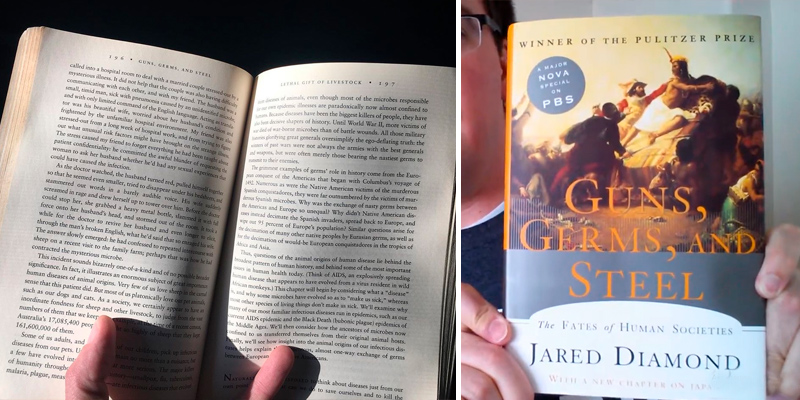
| Last updated price | $23.49 |
| Stock | In stock |
| ASIN | 0393061310 |
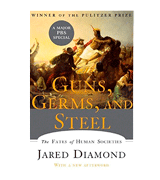
Lewis Dartnell Origins:
Our Planet Is the Answer
People tend to think that they are the masters of the world and often view themselves as almighty ones capable of conquering the forces of nature. But we are what our planet made us, neither more nor less than that. And this is what Lewis Dartnell takes as a basis in his book Origins: How Earth's History Shaped Human History.
Studying the history of human civilization and tracing the roots of the human race, many scientists refer to great leaders, focal historical events, and a human factor overall as the key points in humankind's evolution and development. Unlike those, Dartnell has been searching for the answers in the planet under our feet and has eventually found them. Though today people seem to determine life on the planet, initially, it is the planet that has been shaping human history. And little has changed in this concern today.
In a broad sense, we owe the rise of humanity to the earth and the collision of enormous tectonic plates that kick-started huge geological and climate changes. Those changes, in turn, became a decisive factor for human race evolution. Everything from the Ice age to the interglacial period to the hunting-gathering era to farming to the Iron age had its distinctive direct impact on human civilization. People had to adapt to rapidly changing environmental conditions and responded by enhanced social cooperation and inventive use of technology. In the book, Dartnell smoothly switches from prehistory to history, and skillfully explains the role and impact of the Earth on each stage of human development. Plant and animal domestication, swift rise of farming, armor invention, marine voyages, colonization, and other crucial achievements and events are represented and accounted against the geological background.

Unique Approach
Anthropology books are far from being a light and entertaining read. Though problems and themes they raise are very interesting and draw the attention of many readers, primarily, these are scientific works and all statements and assumptions made need to be maintained by solid facts and reliable data. Thus, there is no space for thrilling plots and intricate storylines, due to which many of these books might seem pretty dry and a bit boring, especially for a common reader.
Origins by Lewis Dartnell, on the other hand, which is distinguished by a unique approach, makes a breakthrough in the genre. The author doesn’t step away from tradition and injects the text with numerous encyclopedic facts that are convincing and trustworthy. Having a sharp eye for details, he smartly pinpoints relevant information. In the meantime, the book doesn’t feel like a compendium of encyclopedic articles and definitely doesn’t sound dry. At times, Diamond “dilutes” the text with curious and funny patterns that not only make it easier and more interesting to read but also make the reader wonder and want to learn more.
In a word, if you are into the subject of humankind's history and origin, this book by Jared Diamond deserves a decent place in your collection and provides a fresh and well-grounded vision on this topic.

| Last updated price | $20.70 |
| Stock | In stock |
| ASIN | 1541617908 |
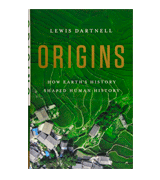
Andrea S. Wiley Medical Anthropology:
A Broader View on Health Problems
Once underestimated, a biocultural approach to health problems and medicine is on the rise and keeps gaining strength nowadays. So, whether you study medical anthropology or review different health approaches within your medical career, Medical Anthropology: a Biocultural Approach will make a perfect introduction to the subject.
Medical anthropology is a sub-branch of biological anthropology that seeks to understand the nature of illnesses and find the primary cause of modern health problems via a biocultural perspective. In other words, it considers the most common contemporary health conditions in the realm of evolutional, historical, and cross-cultural aspects to get to the roots and help apply new knowledge for the improvement and enhancement of current preventive measures and treatment.
The book touches upon the main health issues that greatly impact human societies and reveals how human health interacts and responds to the changes in biology, culture, and environment. The authors analyze present-day biological and medicinal data via evolution and major challenges it threw into human health and survival. The topics covered include healing, diet and nutrition, aging problems, reproductive health, infections, behavioral diseases, stress-related problems, mental illnesses, racial and social inequality. In each chapter, they first provide general biological information on a specific health problem and then survey it from different angles and perspectives to show in detail how medical anthropology can help modern medicine.

A Well-grounded Research
Medical Anthropology: a Biocultural Approach is a textbook often studied in the course of anthropology and favored by many medicinal students and even doctors as well. Created by Professor of Anthropology Andrea S. Wiley and Anthropology Research Associate John S. Allen, the book is expertly written and represents well-grounded research, which is highly informative and educative at the same time. It is laid down in an easy and engaging manner, with practical applications masterfully built into the theoretical framework. The content is smartly structured and organized, with solid logic behind each chapter. There is a whole lot of case studies and practical examples, both current and historical, along with multiple figures and tables for better visualization. Besides, at the end of each part, there is a set of review and critical thinking questions, lists of suggested readings, and a full list of all references and citations made throughout the text to induce readers to think, analyze, and make them crave to learn more.
All in all, if you look for a textbook to introduce yourself to the field of medical anthropology or get an overall view on the subject, Medical Anthropology by Andrea S. Wiley and John S. Allen is an amazing piece of reading for that purpose.
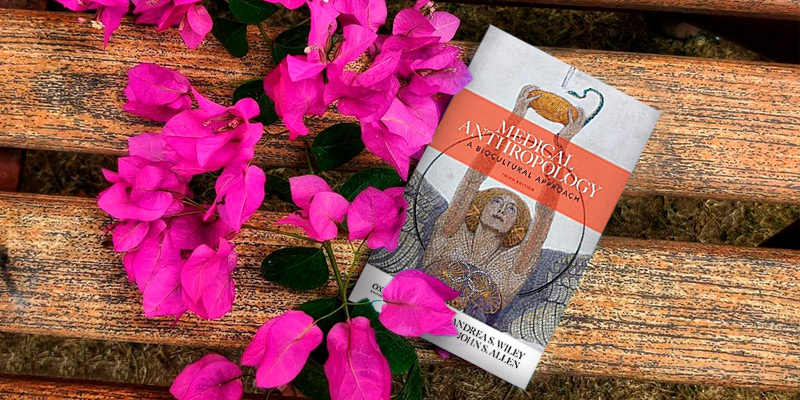
| Last updated price | $64.95 |
| Stock | In stock |
| ASIN | 0190464496 |
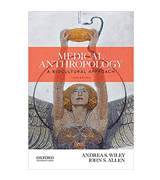
Bryan Sykes Paperback
DNA Chronicles
With a lot of power and secrets behind it, genetics has been the field for multiple investigations and surveys for decades. And anthropology is not an exception in this concern. If you want to find out how all people are genetically close as a race despite all the natural diversity, The Seven Daughters of Eve by Bryan Syke will fascinate you for sure.
While there are a whole lot of stories, hypotheses, theories, and assumptions around the origin of the human race as a species, the genetic survey of professor of genetics from Oxford and a leading authority on DNA evolution Bryan Sykes confidently stands out among multiple works. The book is pushed by the real research Sykes was involved in back in 1994. At that time, frozen remnants of a man who lived about 5,000 years ago were found in Northern Italy. Sykes was able not only to identify a living ancestor of this man but also to put forth and ground the theory of a remarkable gene pertinent to all generations aging back thousands of years and passing through the maternal line.
In the course of the survey, having plotted a whole multitude of DNA sequences, the author finally makes a staggering conclusion that almost all Europeans, no matter where they reside throughout the world, are descendants of one of the seven women, the so-called Seven Daughters of Eve. Sykes named them Ursula, Xenia, Tara, Velda, Helena, Jasmine, and Katrine and depicted their worlds in detail including their migration patterns and their ancestors. As a result, we learn that each of us is a part of a certain DNA group that remains indestructible through millenniums and discover how we can trace our genetic roots and origins.

Serious Things Described With Humor
Making ambitious statements, Bryan Sykes provides solid facts to prove them and uses all his expertise cross-linked to other sciences including paleontology, archaeology, and mathematics for that. Hence, the book in no way lacks argumentation and scientific data. On the other hand though, surprisingly enough, it is not a piece of boring encyclopedic or scientific reading. Sykes shows himself not only as a prominent scientist but also as a truly gifted writer. Written in a narrative manner, the text is engaging and captivating. Some report that it is at times simplistic, yet, it is fairly comprehensible and clear even for ordinary readers who are not specialists in genetics. A scientific book appears lively and easy to read and even has a touch of sharp humor to it.
To sum it up, The Seven Daughters of Eve by Bryan Sykes is a detailed and extraordinary chronicle of the human DNA viewed through history and evolution that has a strong potential to cut down severe debates going on around this issue.

| Last updated price | $43.00 |
| Stock | In stock |
| ASIN | 0393020185 |
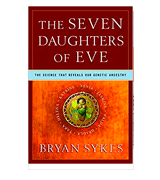
What Is an Anthropology Book?
Want to have an idea of what the future will be like? Then you need to learn the past first. However, it’s easier said than done if you are an ordinary guy and not some kind of scientist, researcher, or investigator. This is where anthropology will come to help. It’s the study of humanity that views people as humans from different angles by considering the past, looking into our biology and genetics, studying our behavior and sociological interactions. Anthropology is all about comparisons and, in a broad sense, it strives to find out the essence of all things. To do that, anthropologists generate multiple hypotheses and check tons of data to test and prove them.
Modern anthropology covers four main subfields, including archaeology, biological, cultural, and linguistic anthropologies. Studying anthropology is not an easy task and anthropology books in their turn help make those studies more structured and organized. Focused on some certain industry, those books introduce us or give a deeper insight into some specific area or field, making it easier to grasp what stands behind it and what it is about. Some books are of a more educating and informative nature and are good for beginners or novices while others are expert-like studies for more experienced and professional readers.
Physics is yet another science that studies the essence of our world through its physical perspective. So, if you are eager to level up or refresh your knowledge in this field as well, our choice of physics books will be of interest to you.
What Features to Compare
Choosing an anthropology book is obviously not an easy task. Unless you know exactly what you want, you can find yourself confused and blown away by the choice of books on this subject. So, before making up your mind, it is worth considering some basic features and aspects to get a piece of read you’ll really like.
Author
Since anthropology books are not a piece of fiction read in the sense we’ve got used to it, checking out the author before buying a book is quite reasonable. To write a book on anthropology, an author needs to have some sort of background education and scientific experience to provide reliable proofs to the statements made, make deep informational analysis, and share personal views and knowledge in a professional manner. So, take a quick look at the author’s biography and professional background to better understand their point of view as you read a book since both expertise and some personal issues and situations tend to leave a mark on the author’s vision and writing style.
Writing Style and Genre
Speaking of which, modern anthropologists have stepped away from dry research papers abound in plain facts and tend to more engaging and inspiring styles to popularize anthropology studies among common readers. Thus, contemporary anthropology books are available in the genres of poetry and fiction as well as in some more creative genres such as plays, mysteries, biographies, and memoirs. To attract multiple audiences, many anthropological texts are written in a more simple and comprehensible language. However, complexity is still a part of anthropology books. Hence check out for the overall style to make sure you’ll enjoy the read.
Field of Study
There are four solid pillars of anthropology this science is constantly revolving around. It’s archaeology, physical or biological anthropology, linguistic anthropology, and socio-cultural anthropology or ethnography. Each of these branches is focused on different aspects of human life and existence and has sub-branches. In a broad sense, archaeology studies human culture via the relics of the past, biological anthropology aims to understand how people adapt to different environments and engages a medical aspect, cultural anthropologists explore human societies and the ways they interact, and linguistic anthropology studies how the language people use links to their global vision and relations between them.
Book Layout
Anthropology books are usually multi-page reads and some structural order is a must for the reader to be able to quickly find the needed data, parts, or chapters and not get lost in a dense informational flow.
Book Type
A modern reader has a really vast choice that is not limited by paperback and hardcover book formats anymore (though those still stay indisputable faves for many of us). Digitalized audiobooks, Kindle editions, and audio CDs will come in handy for the read on-the-go and will let you listen to the book as you drive.
How to Become an Effective Anthropology Reader?
Do I need some specific skills to read anthropology books? Am I good enough for that? The thing is that even if anthropology is not your major and you are not planning to build your career in this field, anthropological reading is beneficial in many ways since it promotes and improves critical thinking that will be of great use, whatever your job or career path.
Anthropological papers and books are not all easy-going reads, it’s a fact. Full of details, subjective facts, and fancy arguments, anthropological articles might be the ones you struggle to read. Yet, don’t give up on that. We have some quick tips to level up your anthropological reading skill and crack those books with ease.
It’s about active reading. Get involved in the text you are reading. Ask questions, criticize, check the facts, re-examine, look for proofs, feel free to doubt. Active reading needs better concentration and requires you to stay focused. It can take a bit more time to finish, yet you’ll be rewarded with a better understanding of key data and information. And it is the only effective way to read for anthropology.
Read when you feel ready for that. Anthropological articles and essays are certainly not the type of fun or leisure read you can do to get relaxed when you feel tired. They need a great degree of attention and concentration, so, the best time to do it is when you feel most energetic and refreshed.
Get engaged in the text. That’s a part of the active reading we’ve mentioned above. Engagement means asking questions and striving to find the answers. What is the author’s main point? What are the most important concepts and ideas the author communicates? What is the methodology behind the research? What evidences are given and what is missing? To get to the gist, it often requires re-reading some parts of the text, which is quite a normal thing for the scientific read.
Anthropological texts are structured differently. Don’t expect to find here a single plot the whole book is built around, which is typical for stories and novels. And you can’t read it as a novel, in the end. Though developing around some basic idea, anthropological books consist of individual parts you can read more than once to finally see how they are put together.
Take a quick look. This method works really great if you feel like getting stuck in the very beginning. Yet, it in no way means you need to put the book away till better days. Look through it to get the general idea of what it is about. Read titles, subtitles, and introductory paragraphs. It will help you discover the basic themes and subjects to continue reading with more interest.
Observe and analyze. An anthropology reader is a perfect observer with a sharp eye for details. Reflect on what you read, you are free even to make some notes and put down your observations to better understand the author’s standpoint and the arguments presented to prove it as well as to see if that standpoint meets yours. A deep step-by-step analysis of collected data is one of the best anthropological methods.




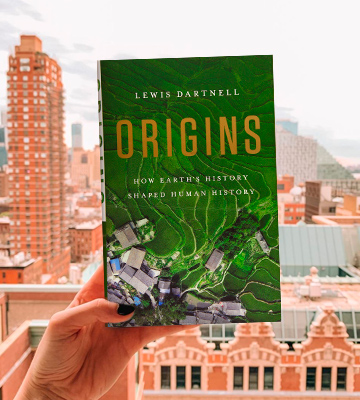
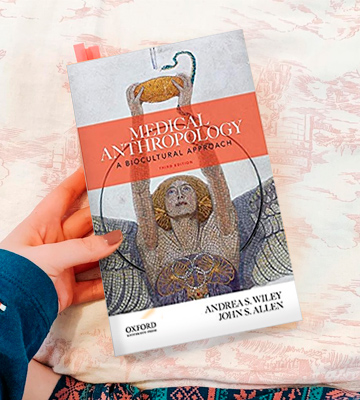


Your comment was successfully sent
Error! Please try again later